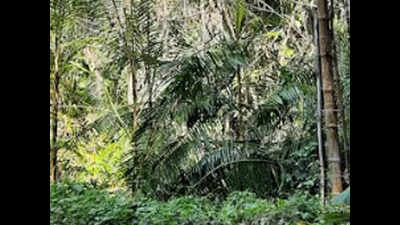- News
- City News
- mangaluru News
- Greens oppose cane plantation in Western Ghats of Dakshina Kannada
Trending
This story is from July 1, 2020
Greens oppose cane plantation in Western Ghats of Dakshina Kannada
Members of the National Environment Care Federation (NECF) have decided to oppose the forest department’s plans of planting cane on more than 3,000 acres in the Western Ghats of Dakshina Kannada district.

Dakshina Kannada district already has 15,000 hectares of naturally grown cane out of its 1,25,000 hectares of natural forests
MANGALURU: Members of the National Environment Care Federation (NECF) have decided to oppose the forest department’s plans of planting cane on more than 3,000 acres in the Western Ghats of Dakshina Kannada district.
Environmentalists say that the department has plans to promote handicrafts and furniture making through cane cultivation. They allege that planting cane in large areas will have adverse effects in the form of forest destruction.
NECF secretary Shashidhar Shetty told TOI that he has decided to write to the principal chief conservator of forests (PCCF), Karnataka.“Growing cane affects other trees and animals. It will reduce the forest thickness. However, the forest department is interested in commercial value of cane in the market. We will be writing to the PCCF,” he said.
When contacted, deputy conservator of forest V Karikalan told TOI that cane has several advantages when it comes to the protection of nature.
Dakshina Kannada district already has 15,000 hectares of naturally grown cane out of its 1,25,000 hectares of natural forests, he said.
“Natural regeneration of cane takes place on its own through the spread of seeds. As part of assisted natural regeneration, we have been growing species endemic to Western Ghats and not introducing any foreign species. In addition to cane, we also have plans to grow various other endemic plants,” he added.
The forest department has already planted cane, including Calamus prasinus (ontibetha), Calamus thwaitesii (handibetha), Calamus nagabettai (naga betha) on about 3,700 acres and has plans to add more than 1,000 acres.
Environmentalists say that the department has plans to promote handicrafts and furniture making through cane cultivation. They allege that planting cane in large areas will have adverse effects in the form of forest destruction.
NECF secretary Shashidhar Shetty told TOI that he has decided to write to the principal chief conservator of forests (PCCF), Karnataka.“Growing cane affects other trees and animals. It will reduce the forest thickness. However, the forest department is interested in commercial value of cane in the market. We will be writing to the PCCF,” he said.
When contacted, deputy conservator of forest V Karikalan told TOI that cane has several advantages when it comes to the protection of nature.
“Cane grows only in evergreen forests of Western Ghats. It grows only by the sides of valleys and not in the middle of trees. We are not growing cane in the middle of the forests. We are growing endemic species of canes in the lower boundaries and by the side of streams. The advantages of growing cane include prevention of soil erosion and leaching of nutrients,” he said.
Dakshina Kannada district already has 15,000 hectares of naturally grown cane out of its 1,25,000 hectares of natural forests, he said.
“Natural regeneration of cane takes place on its own through the spread of seeds. As part of assisted natural regeneration, we have been growing species endemic to Western Ghats and not introducing any foreign species. In addition to cane, we also have plans to grow various other endemic plants,” he added.
The forest department has already planted cane, including Calamus prasinus (ontibetha), Calamus thwaitesii (handibetha), Calamus nagabettai (naga betha) on about 3,700 acres and has plans to add more than 1,000 acres.
End of Article
FOLLOW US ON SOCIAL MEDIA











